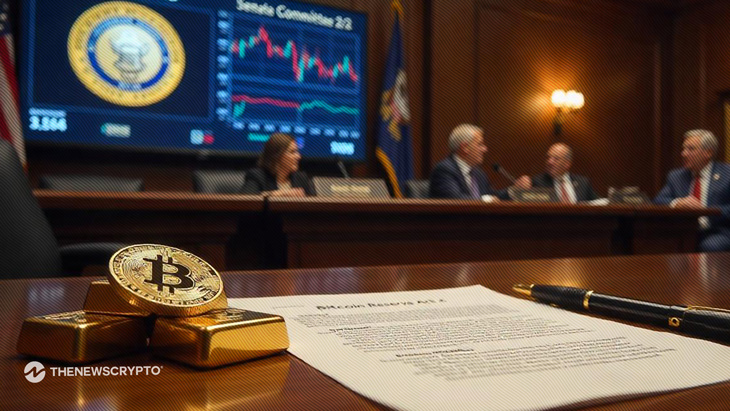Swiss National Bank Rejects Bitcoin Reserve Citing Volatility Concerns

- The Swiss National Bank rejected adding bitcoin to its reserves due to high volatility.
- Citizens are pushing for a referendum to include bitcoin for financial protection.
- Switzerland stays cautious as other countries explore bitcoin reserves.
Switzerland’s famed financial conservatism clashed with the modern crypto wave as the Swiss National Bank firmly rejected to include bitcoin in its national reserves. As inflation concerns and geopolitical tensions rise globally, the supporters of digital currencies are pushing for Switzerland to adopt a more diversified approach, one that includes bitcoin alongside gold. But the SNB is not convinced.
SNB Chairman Cites Volatility and Policy Concerns
During its shareholder assembly in Bern on April 25, SNB Chairman Martin Schlegel dismissed the idea of adopting bitcoin as part of the bank’s reserve strategy. He emphasised that cryptocurrencies like Bitcoin are far too volatile to be considered reliable reserve assets. “Cryptocurrency cannot currently fulfil the requirements for our currency reserves,” Schlegel said, highlighting the SNB’s need for highly liquid and stable assets.
The recent push for bitcoin reserves comes as citizens prepare a referendum initiative aimed at compelling the SNB hold bitcoin. Advocates believe that adding bitcoin help protect Switzerland’s financial stability amid growing global economic uncertainty. Particularly in light of market volatility sparked by geopolitical events, including U.S. tariff policy under Donald Trump.
Schlegel, however, maintained that the SNB’s reserves must serve the core purpose of implementing monetary policy effectively. Assets in these reserves need to be easily tradable and resistant to extreme price swings, criteria that bitcoin, in his view, fails to meet.
Global Momentum Builds as Switzerland Holds Back
This isn’t the first time Schlegel voiced resistance. In March, he told Bloomberg Television that digital currencies lack the fundamental stability required by reserve assets. He also noted that cryptocurrencies are software-based and vulnerable to technical risks like bugs, which further diminishes their suitability.
Meanwhile, the debate over national bitcoin reserves is heating up globally. In March, the U.S. made headlines by establishing a strategic bitcoin reserve using crypto seized in legal cases. Other nations are exploring similar moves, while some, like Switzerland, remain cautious.
Despite growing external pressure and changing global attitudes, the SNB is holding its ground, keeping crypto firmly out of its traditional playbook, at least for now.
Highlighted Crypto News Today:
Read More

New Hampshire BTC Investment Bill HB302 Clears Second Senate Committee
Swiss National Bank Rejects Bitcoin Reserve Citing Volatility Concerns

- The Swiss National Bank rejected adding bitcoin to its reserves due to high volatility.
- Citizens are pushing for a referendum to include bitcoin for financial protection.
- Switzerland stays cautious as other countries explore bitcoin reserves.
Switzerland’s famed financial conservatism clashed with the modern crypto wave as the Swiss National Bank firmly rejected to include bitcoin in its national reserves. As inflation concerns and geopolitical tensions rise globally, the supporters of digital currencies are pushing for Switzerland to adopt a more diversified approach, one that includes bitcoin alongside gold. But the SNB is not convinced.
SNB Chairman Cites Volatility and Policy Concerns
During its shareholder assembly in Bern on April 25, SNB Chairman Martin Schlegel dismissed the idea of adopting bitcoin as part of the bank’s reserve strategy. He emphasised that cryptocurrencies like Bitcoin are far too volatile to be considered reliable reserve assets. “Cryptocurrency cannot currently fulfil the requirements for our currency reserves,” Schlegel said, highlighting the SNB’s need for highly liquid and stable assets.
The recent push for bitcoin reserves comes as citizens prepare a referendum initiative aimed at compelling the SNB hold bitcoin. Advocates believe that adding bitcoin help protect Switzerland’s financial stability amid growing global economic uncertainty. Particularly in light of market volatility sparked by geopolitical events, including U.S. tariff policy under Donald Trump.
Schlegel, however, maintained that the SNB’s reserves must serve the core purpose of implementing monetary policy effectively. Assets in these reserves need to be easily tradable and resistant to extreme price swings, criteria that bitcoin, in his view, fails to meet.
Global Momentum Builds as Switzerland Holds Back
This isn’t the first time Schlegel voiced resistance. In March, he told Bloomberg Television that digital currencies lack the fundamental stability required by reserve assets. He also noted that cryptocurrencies are software-based and vulnerable to technical risks like bugs, which further diminishes their suitability.
Meanwhile, the debate over national bitcoin reserves is heating up globally. In March, the U.S. made headlines by establishing a strategic bitcoin reserve using crypto seized in legal cases. Other nations are exploring similar moves, while some, like Switzerland, remain cautious.
Despite growing external pressure and changing global attitudes, the SNB is holding its ground, keeping crypto firmly out of its traditional playbook, at least for now.
Highlighted Crypto News Today:
Read More

